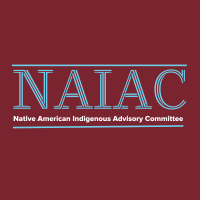The Native American Indigenous Advisory Committee (NAIAC)

The Native American Indigenous Advisory Committee's purpose is to advise the Chancellor of University of California, Davis on Native American and Indigenous perspectives, policy and development that directly impacts Native American and Indigenous students, faculty and staff.
Why Join NAIAC?
We advocate for a Native American and Indigenous Advisory Committee to address matters pertaining to Native American and Indigenous peoples. This committee will not only help guide productive projects that recognizes tribal sovereignty and protocol but will also help resolve future conflicts that marginalize Native American and Indigenous voices and inflict harm on our community.
Stay Connected
Connect with NAIACC on Instagram! @naiacc_ucd
Mission Statement
- The Native American and Indigenous Advisory Committee will guide the Chancellor regarding community engagement, sovereignty and autonomy. This position will not only help guide productive projects that recognize tribal sovereignty, protocol, mutual respect and inclusivity, but will also help resolve future conflicts that marginalize Native American and Indigenous voices and inflict harm on our community.
Background and Context
- The Native American Studies (NAS) program at University of California, Davis was created in 1969 by professors David Risling, Jack Forbes, Carl Gorman and Sarah Hutchinson. Our NAS program is a pillar in the UC system because a major and minor bachelor's degree are offered, as well as, a master's degree and a doctoral degree. This makes UC Davis one of only three universities in the United States to offer a doctorate. Since its establishment more than 50 years ago, the program continues to contribute to Native American and Indigenous theoretical thought, Nation building and intellectualism. It is imperative that the University remain accountable to Native American and Indigenous Nations across the hemisphere and continue to build respectful and reciprocal relationships.
For decades, Native American and Indigenous students, staff, and faculty have advocated for a comprehensive approach to creating and sustaining a thriving Native American and Indigenous community at UC Davis. Despite advances in the University’s approach to increasing the enrollment and completion rates of American Indian and Alaska Native students, much work remains to be done to holistically address persistent inequities impacting Native American and Indigenous students, faculty, and staff. It is imperative that the University examine systems, policies, and practices to ensure that we comprehensively address institutional inequities.
Native American and Indigenous issues and concerns are distinct from various issues of other ethnic and cultural groups residing in the United States. Our histories extend far beyond settler histories; Native American and Indigenous communities are inherently unique and diverse, each with its own culture, languages, histories, and traditions. It is critical to recognize that “Native American” is not a one-dimensional ethnic classification, but is also descriptive of the cultures, histories, and distinct political organizations and implications for which this term is used.
Native American and Indigenous students have gained immense support regarding the call for an Advisory Committee. Recently, MEChA de UC Davis released a statement of support and further condemned the misappropriation and marginalization that has caused harm to the Native American and Indigenous campus community. Also, ASUCD has drafted a resolution in collaboration with Native American and Indigenous students regarding the continued marginalization that overlooks our histories, voices and experiences. The supportive ASUCD resolution was introduced into the Academic Senate the week of May 6, 2019. - Membership List
Sheri Atkinson, Associate Vice Chancellor, Student Affairs
Ines Hernandez-Avila, Professor, Native American Studies (retired)
Seth Johnson, Graduate Student
Christina Kazhe, Attorney, Kazhe Law Group PC
Ari Kelman, Faculty Advisor to the Chancellor and Provost
Adrian Lopez, Government & Community Relations
Beth Rose Middleton-Manning, Professor, Native American Studies
Veronica Moreno, Undergraduate Student
Megon Noble, NAGPRA Coordinator
Pablo Reguerin, Vice Chancellor, Student Affairs
Ingrid Sub Cuc, Graduate Student (NAIAC Co-Chair)
Jean M. Tayac, Undergraduate Student
Hulleah Tsinhnahjinnie, Director, C. N. Gorman Museum
Renetta Tull, Vice Chancellor, Diversity, Equity, and Inclusion (NAIAC Chair)
Michelle Villegas-Frazier, Director, Strategic Native American Retention Initiatives
Jean Tayac, Lakota and Piscataway Nation
Vacant, Wintun Nation (To be named by the Yoche Dehe Tribal Council)
- Meet the Student Members of NAIAC
Emma Cape
Pronouns: she/her
What you are studying: Master's degree in Native American Studies
Tribal Affiliation(s): Ojibwe and LenapeWhy you wanted to be involved in NAIAC: To amplify Indigenous voices! We've always advocated for our peoples and communities, but often while going willfully unheard. This committee provides a platform in which we give UC Davis administration no other option than to hear us and to listen.
Veronica Octaviana Moreno
Pronouns:She/Her/Ella
What are you studying: Native American Studies, Minoring in Chicano studies
Tribal Affiliation(s): Pascua Yaqui Tribe of ArizonaWhy you wanted to be involved in NAIAC:My vision of being a representative is to be able to be a positive moving force for others. I want to be able to bridge some of the gaps in communication between our community and the chancellor and because of this, I chose to be involved in NAIAC.
Ingrid Sub Cuc
Pronouns: she/her/ella
What you are studying: Ph.D. in Native American Studies with a focus on health and wellbeing
Tribal Affiliation(s): Maya Kaqchikel and Q'eqchi'Why you wanted to be involved in NAIAC: I wanted to be involved with the committee because I want to contribute to building a campus that is safe and welcoming to Native American and Indigenous students. NAIAC is a great space for Native American and Indigenous students to elevate our needs, concerns, achievements and contributions. I am excited to be serving with three other incredible students on this committee!
